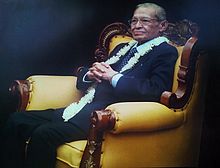Hasan di Tiro
| Tengku Hasan Muhammad di Tiro | |
|---|---|
 |
|
| Nickname(s) | Wali, Hasan di Tiro |
| Born |
25 August 1925 Aceh, Dutch East Indies |
| Died | 3 June 2010 (aged 84) Banda Aceh, Indonesia |
| Allegiance | Free Aceh Movement (GAM) |
| Years of service | 4 December 1976 – 27 December 2005 |
| Rank | Wali Neugara Acheh-Sumatra |
| Commands held | National Acehnese Army |
| Battles/wars | Insurgency in Aceh |
Tengku Hasan Muhammad di Tiro (25 August 1925 – 3 June 2010), born Hasan Bin Leube Muhammad, was the founder of the Free Aceh Movement (GAM), an organisation which attempted to separate Aceh from Indonesia from the 1970s. It surrendered its separatist goals and agreed to disarm as agreed to in the Helsinki peace deal of 2005. He was a descendant of Tengku Cik di Tiro on maternal side, an Indonesian national hero who was killed fighting the Dutch in 1891. In 2010 he obtained his Indonesian citizenship back shortly before his death.
Coming from a prominent family, from village of Tiro (Pidie Regency), di Tiro studied in Yogyakarta and fought against the Dutch during the Indonesian National Revolution. He then continued his studies in United States, where he did part-time work for Indonesian Mission to the United Nations. While a student in New York City in 1953, he declared himself the "foreign minister" of the rebellious Darul Islam movement, which in Aceh was led by Daud Bereueh. Due to this action, he was immediately stripped of his Indonesian citizenship, causing him to be imprisoned for a few months on Ellis Island as an illegal alien. The Darul Islam rebellion in Aceh itself ended in a peace deal in 1962. Under the peace deal Aceh was granted nominal autonomy.
Di Tiro re-appeared in Aceh in 1974, where he applied for a pipeline contract in the new Mobil Oil gas plant to be built in Lhokseumawe area. He was outbid by Bechtel, in a tender process in which di Tiro thought the central government had too much control. It has been claimed that, as result of this loss and the death of his brother due to what he considered to be deliberate neglect by a doctor of Javanese ethnicity, di Tiro began organising a separatist movement using his old Darul Islam contacts.
...
Wikipedia
